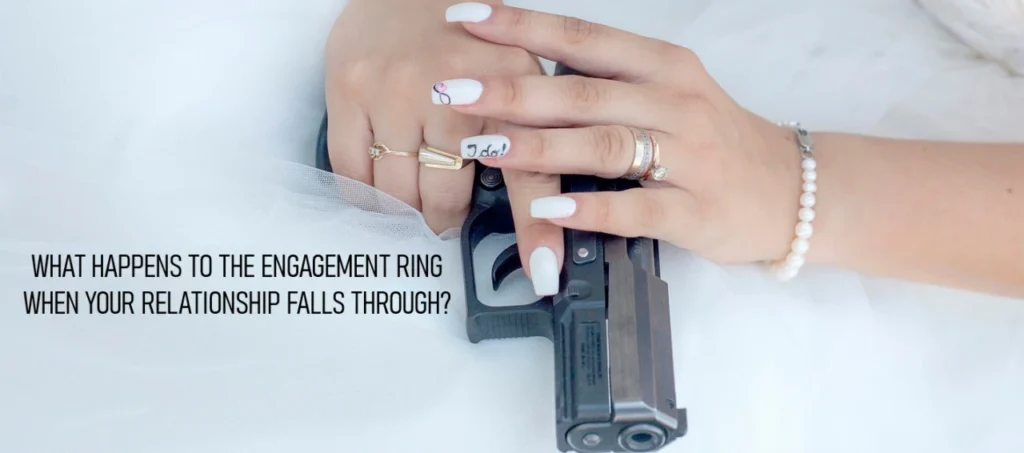- Can A Gift be Taken Back?
- Can I Keep the Ring if the Breakup Wasn’t My Fault?
- When Do I Legally Have to Give the Engagement Ring Back?
- How Long Should You Wait to Ask for the Engagement Ring Back Before the Gift Becomes Absolute?
- What Happens if I Sell the Engagement Ring?
- Who legally owns an engagement ring after divorce in Canada?
- Are There Any Exceptions?
- Will a Domestic Contract Protect My Rings in Case I Get Divorced?
- Learn More
Can A Gift be Taken Back?
Under contract law, a gift is a legally enforceable transfer of personal property. For a gift to be fully enforceable it requires these elements (McNamee v. McNamee):
- The donor voluntarily intended to make the gift.
- No payment was provided in exchange for the gift.
- The gift was accepted by the donee.
- There was actual delivery of the gift to the donee.
If all the legal elements of a gift are met, the gift is not recoverable by the person who gave it.
However, the difference between engagement rings and basic gifts is that most gifts are not given with a promise attached to them. The unique nature of an engagement ring is that it is given with the promise of marriage to your significant other, making it a conditional gift.
If a donor of the ring cannot show that the ring was given with this condition, the ring will be considered to have been a basic, unconditional gift that does not have to be returned to the donor.
Can I Keep the Ring if the Breakup Wasn’t My Fault?
Traditionally, if a ring was given with the contemplation of marriage, courts typically support the proposition that it was a conditional gift and must be returned to the donor when the marriage does not occur. However, in addition to the condition of marriage, the courts consider who broke off the engagement (McArthur v Zaduk). If the donee did, the donor would be able to recover the ring, and vice versa.
However, be careful not confuse who factually broke off the engagement with whose fault it was for the breakup.
According to the Marriage Act of Ontario, fault is now not a factor when determining whether the donor of the ring can rescind the gift. This means that courts cannot take into account the cause of the breakup.
For example: Billy asked Sally to marry him and gave her an engagement ring. Sally said “Yes!”. Unfortunately, Billy discovers that Sally has been unfaithful, and he breaks off the engagement. Billy may not be able to recover the ring as he was the one who broke off the engagement even though Sally’s infidelity caused the breakdown of the relationship. The court will not consider Sally’s fault.
When Do I Legally Have to Give the Engagement Ring Back?
We now know that under the Ontario legislation, the question of who caused the breakup is irrelevant in determining the right of the donor to recover the ring. Nevertheless, courts have shown leniency to donors who have explicitly asked for the ring back in a timely manner. If a request to get the ring back is significantly delayed, the courts may believe that the donor intended the ring to be an unconditional gift that can be kept by the donee. If a request is made shortly after or even during the engagement, the donee may be responsible for returning the ring back to its donor.
How Long Should You Wait to Ask for the Engagement Ring Back Before the Gift Becomes Absolute?
Although you cannot find a definite answer to this question in the legislation, case law can guide us towards what courts consider to be “requested in a timely manner”.
For example, in a case called Newell v Allen, a man gave his girlfriend an engagement ring when he asked her to marry him. She accepted his proposal, but the couple eventually separated. The man moved out of their home 8 months after the separation and, at this time, asked for the ring back.
Although it took more than half a year for the man to make his request for the ring to be returned, the judge was satisfied that the man’s demand was made in a timely manner as his actual departure from the home coincided with the request to return the ring.
What Happens if I Sell the Engagement Ring?
When a couple is dividing their possessions after a rough breakup, it is common for the parties involved to want to retain more than their fair share of the assets, especially if their value is more than nominal. If you are in possession of a diamond engagement ring, you may think that getting rid of it and maybe getting some money for it may be the best way to stop your partner from getting it back. However, following through with this idea may not be the smartest move.
An Ontario woman found out the hard way when she was ordered by the court to compensate her ex-fiancé for the full price of the ring even though she sold it for 1/7th of its actual value (Pavan v Laudadio). In this case, the couple was at a disagreement about who gets to keep the $22,000 engagement ring after their engagement ended. The donor of the ring demanded its return, but the woman refused. Instead, during the court proceedings she sold the ring for $3,000 with the belief that if she no longer possessed it, she could not be forced to return it.
The court did not support her view. The judge ruled that since the ring was a conditional gift and the marriage did not occur, the ring must be returned to the donor. As the recovery of the ring was impossible, she was ordered to pay the full value of the ring ($19,000 over what she earned from its sale!)
So, if you are ever in dispute about who should keep the engagement ring, hold off on selling it, especially if you are in the process of a lawsuit.
Who legally owns an engagement ring after divorce in Canada?
Although there are couples who forced to experience the fall of an engagement, there are still many who make it down the aisle. Some end up living out their lives happily together, while some realize that things aren’t working out as well as they hoped. If divorce or separation is on the line, what happens to the engagement ring?
When spouses are not able to separate amicably, they usually require the involvement of courts and lawyers to help them divide their assets through a process called equalization. This process aims to puts the spouses in an equal financial position by allowing each party to each calculate the value of their assets and then divide them equitably.
For the calculation, not all assets are counted. The Family Law Act in Ontario outlines that assets owned by spouses on or before the date of marriage, such as an engagement ring, are deducted from the spouses’ net property value.
In the case of Roback v Roback, the court concluded that the husband’s wedding ring and the engagement and wedding rings of the wife were owned as of the marriage date. For this reason, the rings’ value is excluded from the equalization process. This means that there was no requirement to share the value of the ring as they were given before to marriage.
Are There Any Exceptions?
Although an engagement ring’s value can be deducted from the calculation if it was given prior to marriage, any increased value of the ring during marriage may be subject to division between spouses. If the ring’s monetary value has been intermingled with other family assets, it will also be subject to sharing.
For example: Sally and Billy are married. Sally sold her $10,000 engagement ring to help pay off the mortgage and do some renovations on the family home. The couple is now getting a divorce and dividing assets. Since Sally intermingled the value of the ring with other family assets, she cannot deduct it from their personal net family property calculation despite receiving it before marriage. The courts will presume that she intended to gift half of the value of the ring to Billy.
Will a Domestic Contract Protect My Rings in Case I Get Divorced?
A domestic contract, such as a prenuptial agreement, can determine which assets will be part of the equalization process in case the couple gets a divorce. In a recent 2021 case, a domestic contract saved a woman’s engagement ring when her soon-to-be-ex-husband tried to take it from her (Murray v Choudhary).
The couple signed a prenup in 2007 which described what assets each person gets to keep if they ever got a divorce. The couple agreed that the engagement and wedding ring would be the woman’s to keep if they break up.
After a long 14 years, the couple filed for a divorce. Despite the contract signed before marriage, the man took back the engagement ring. The court found that the prenuptial agreement was valid and ordered the man to return the rings. Since he did not comply, the court ordered the equalization payment to the ex-wife to be increased by the value of the rings stolen from her.
Calling off an engagement or ending a marriage is not an easy decision, but sometimes relationships just don’t work out. Here are some things you should keep in mind to protect yourself:
- Make it clear that the diamond ring you are giving your beloved is an engagement ring and not a basic gift. An unconditional gift, such as a gift for birthdays or Christmas, are enforceable under contract law.
- Understand that the law cannot punish the person who was at fault for the end of the engagement, but it will take into consideration who ultimately broke it off.
- Ask for the ring promptly if the engagement fails.
- Do not try to sell the ring, especially if you are in a court proceeding about its ownership.
- If you are already married and want to keep the ring, do not intermingle it with other family assets.
- Sign a domestic contract with your partner. It can specify who gets to keep which assets in the case of a breakup.
- Most importantly, make sure you know the person you will be marrying before getting down on one knee!
Learn More
Business Charity Child Support community Contracts COVID-19 divorce Estate Planning Family Law immigration Incorporation In The News Not For Profit Postnup Power of Attorney Real Estate Registration separation agreement Sponsorship Startup Taxes Wills Wills & Estates Wills and Estates Work Permit


